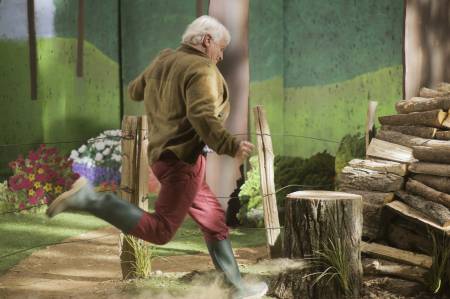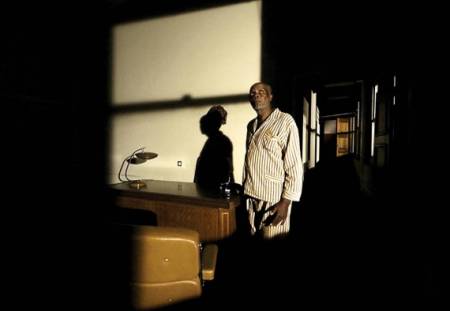-
Alain Resnais: LIFE OF RILEY (2014)
ALAIN RESNAIS: LIFE OF RILEY/AIMER, BOIRE ET CHANTER (2014)

ANDRÉ DUSSOLLIER IN LIFE OF RILEY/AIMER, BOIRE ET CHANTER
Farcical intrigue pursued right up to a lighthearted death
Alain Resnais' last film -- the prolific French director died six months ago at 92 -- is adapted from a British comedy by the equally prolific Alan Ayckbourn called Relatively Speaking. This is Resnais' third adaptation of an Ayckbourn play, after the 1993 Smoking/No smoking and the 2006 Private Fears in Public Places (Coeurs), and seems the most sparkling and accessible and enjoyable of the three. It is not a final testament or film farewell, even though it revolves around an unseen main character, George Riley, who has cancer and has been given six months to live. Even if the director knew he would soon die, as he well might, at 91, this is simply light entertainment; and Resnais was working on another film before he passed away. If may seem mildly avant-garde to shoot a play so it looks so much like a play; Resnais courted artificiality and spliced avant-garde formalism onto popular culture in much of his work. He does so particularly entertainingly here. As adapted, the play feels like a French boulevard comedy (but as theTélérama critic points out, without the slammed doors), with its farcical confusion of wives of friends and ex-wife and girlfriend all of whom Riley convinces he's inviting on a vacation to the Canary Islands, when he actually goes with a sixteen-year-old girl, Tilly. That action is kept simple but it's offset by the wit of the other situation: everyone is rehearsing the amateur production of a play, which George is enlisted to play in too -- they calculate that he will live to perform in it. In the first scene, the breakfast conversation between Colin and his wife Kathryn is bizarrely artificial, and we learn they are actually rehearsing their lines in the play.
The cast consists of Resnais regulars, all actors with a lot of experience on the French stage as well as in films. The emphasis is on their skillful work. This is really just a filming of rudimentary sets. Jerry-built houses are fronted by draped cloth in place of windows and doorways. Films of English landscape near York, the play's setting, are shown, with dissolves into clever and more complete drawings of the houses of the various characters, which then dissolve into closeups of the simple sets with two or four actors speaking. Sabine Azéma (Resnais' wife) is married to doctor Hippolyte Girardot; Caroline Sihol is married to George's childhood friend Michel Vuillermoz, who has become rich; Sandrine Kiberlain has left George and gone to live with a farmer, André Dussollier (underused here). Sandrine Kiberlain and Caroline Silhol are experienced thespians but welcome new faces in the Resnais "troupe," the rest are longtime regulars.
Life of Riley/Aimer, boire et chanter, 107 mins., debuted at Berlin in February 2014 and opened in France in March (AlloCiné press rating: 3.7), playing at many international festivals. It was screened fort this review as part of the 52nd New York Film Festival. Showing at Lincoln Plaza Cinemas NYC from 24 October 2014.
Last edited by Chris Knipp; 11-19-2014 at 11:50 PM.
-
Mia Hansen-Løve: EDEN (2014)
MIA HANSEN-LØVE: EDEN (2014)

FÉLIX DE GIVRY IN EDEN
Drugs, women, and song: a subtle hymn to rave music that's a bit too much
Mia Hansen-Løve’s fourth feature, technically her most ambitious yet, takes her pursuit of the personal a bit far in its beautiful but exhaustive and incident-and-character-rich but major-plot-poor decade-plus saga of her brother (and co-scripter) Sven's experience (he's called Paul here and played by Félix de Givry) as a pioneer DJ of the Paris rave scene, specializing in Garage music. Paul and his friends, including Guy-Manuel de Homem-Christo and Thomas Bangalter (otherwise known as Daft Punk) are riding a dream of ecstasy (and for a while at least also the drug by that name) in their pursuit of the DJ life. Eventually as the Nineties meld into the 2000's and beyond, Paul, whose girlfriends are too numerous to keep track of (an early one is played by Greta Gerwig), begins to question if he wants to spend his life as a DJ. He also has developed a decade-long problem with cocaine, and encounters financial problems with unprofitable bands and clubs so his mother's checks and his trust fund administrators' generosities dry up. Along the way there are trips to New York and Chicago and visiting black singers who demand suites in five-star hotels and changes in musical tastes.
It's all in a gorgeous gray haze in the widescreen photography of Denis Lenoir: visually this film is a pleasure from first to last and right at the end there are some scenes of poetic beauty. Hansen-Løve is always a class act, and she and her brother show a full awareness that the world they are remembering was a feast (as well as an overdose) for the senses. Even the intertitles are pretty and tasteful. But she might have been too close to the story of her brother's experience to envision a fully independent film here that might have soared off on its own or had a simpler, more defined narrative shape. Recommended mostly for fans of discotheques and raves and the kind of music they offer.
The taste includes a certain restraint in the sound: we don't get our brains damaged or our ears blasted. Not that Hansen-Love's DJ world isn't complex and subtle in its awareness of contradicitons: as the Guardian's Paul McInnes says, "Glamour is twinned with mundanity, beauty with boorishness and friendship with selfishness, while artistic endeavour is undercut by self-indulgence." But I longed to see Whit Stillman's The Last Days of Disco again. For me, though Hansen-Løve’s 2007 first film All Is Forgiven is precocious and elegant, her 2011 memory of teen romance Goodbye First Love/Un amour de jeunesse is poetic and lovely, her 2009 Father of My Children/Le père de mes enfants remains her finest, richest film. Critics seem impressed by the complexity of Eden though, and it has gotten raves. It does not detract from the director's luster as among the most gifted of the young French directors.
Eden, 131 mins., debuted at Toronto, with big festival showings including San Sebastian, Busan, and London. Screened for this review as part of the 52nd New York Film Festival (its US premiere). It opened in French cinemas 19 November 2014 to a fair critical reception (AlloCiné presds rating 3.1). Les Inrocks was very admiring, Cahiers disparaging.
Limited US theatrical release 19 June 2015.

STILL SHOWING FILM LOOK, FORMAT; THIS FACE IS HANSEN-LØVE IN FOREGROUND
Last edited by Chris Knipp; 04-30-2020 at 12:27 PM.
-
Jean-Pierre, Luc Dardenne: TWO DAYS, ONE NIGHT (2014)
JEAN-PIERRE, LUC DARDENNE: TWO DAYS, ONE NIGHT (2014)

Marion Cotillard in Two Days, One Night
The profound humanism of the Dardennes meets the sublime beauty of Marion Cotillard
What can we add to our appreciation of the Dardenne brothers' profound humanism and grasp of working class poor hard knocks? The sublime beauty of Marion Cotillard as a woman recovering from debilitating depression who must visit a dozen-plus co-workers to beg them to vote for her instead of a €1000 bonus. Two Days, One Night dramatizes how in modern labor situations if the firm is too small for a union, management pits one worker against another. Hence when Sandra (Cotillard) is about to return to work, she learns owner M. Dumont (Batiste Sornin) and his supervisor Jean-Marc (Olivier Gourmet) have forced her coworkers to choose between the bonus and keeping her on, as if it had to be one or the other. This is a study in courage. It dramatizes the everyday struggle to stay where you are; how, minute by minute, the poor must fight just to hope. Probably in the post-Great Recession world this is a situation more people can relate to, when homelessness or a steep dive from a formerly comfortable lifestyle can lie in wait even for members of the middle class.
Even by Dardennes standards, Two Days, One Night thrives on its ordinariness and specificity. One by one, with support from her husband Manu (Dardennes regular Fabrizio Rongione, seen also in the 2014 NYFF in Green's very different Sapienza), Sandra visits or calls the others, and each is particular, each much the same. Each in the multi-ethnic crew needs the extra money, feels for her, but must look to themselves. Different only are Timur (Timur Magomedgadzhiev), a spare time soccer coach, who feels so guilty and indebted to Sandra for her covering for him when he messed up as a newbie, met by the soccer field, he bursts into tears; and Alphonse (Serge Koto), not yet hired on full time, tracked down at the laundromat, who simply fears reprisals from the other workers if he votes for her, though doing so is what God tells him to do.
Otherwise the narrative stays close to these similar one-by-one meetings, avoiding surges of drama -- though there is drama in Sandra's sorrow and emotional pain. She claims to all she is "en forme" again now, but to Manu she constantly pleads she can't go on, feels like nobody. A possible wrong note: she pops too many pills, and when it turns out apparently to be Xanax, you wonder if this would be possible. Then she recovers from a suicide attempt perhaps too fast, too easily.
Cotillard is the most high-profile actor the Dardennes have used but proves a perfect fit. Their meeting with her near the set of Audiard's Rust and Bone was love at first sight. They could "not stop talking about her, her face, her look." And she was thrilled; had thought working for them was "beyond my reach." Her style is to hide dramatics, and so harmonizes perfectly with their way of working, and her dedication met the challenge of "becoming Belgian." Their last film, The Kid with the Bike, also featured a beautiful woman star, Cécile de France, but she is Belgian (and not the international star Cotillard has become). Cotillard is an actress who can make anything moving. Her presence here deepens an almost unconscious identification one feels, even as the action of Two Days, One Night may be less of a blow to the stomach than films like The Child, The Son, or La Promesse and less high-speed than Rosetta or The Kid with the Bike. Yet I think Two Days, One Night, which compares well with other powerful French-language films about work like Laurent Cantet's Time Out and Human Resources, has an unobtrusive beauty that will slowly creep into your heart and stay there.
Two Days, One Night/Deux jours, une nuit, 95 mins., debuted at Cannes in Competition and opened the next day in France and Belgium (Allociné press rating: 4.0). Many other festivals and international releases; Telluride, Toronto, Vancouver. Screened for this review as part of the 52nd New York Film Festival. US theatrical release by IFC 24 December 2014, in NYC at Lincoln Plaza Cinemas and IFC Center.
Last edited by Chris Knipp; 11-25-2014 at 11:12 AM.
-
Pedro Costa: HORSE MONEY (2014)
PEDRO COSTA: HORSE MONEY (2014)

More of Costa's aestheticized dream world of memory, poverty, exile, and loss]
I reviewed Costa's previous feature, the nearly three-hour 2006 Colossal Youth, as part of the 2007 San Francisco Film Festival -- my first experience of Costa and a "challenging" and "numbing" one, to use words from Justin Chang's review for Variety. This time the Variety review of Costa's new film Horse Money is by Scott Foundas and it is glowing. Foundas calls the film Costa's "most striking" view yet of the Lisbon Cape Verdean underclass in the slum neighborhood known as Fontainhas and his "muse," the aging former construction worker Ventura, that he has long depicted.
In between, there was the 2009 New York Film Festival screening I reviewed of Costa's handsome and relatively short musical feature about Jeanne Balibar, Ne Change Rien, in intense contrasty black and white. This film was much easier to take. It also showed clearly that Costa is a filmmaker who likes his documentary elements heavily laced with visual beauty and aestheticism.
He has outdone himself this time, producing a livelier and more handsome work focussed on the Cape Verdeans of Lisbon than Colossal Youth ( and with a more manageable run-time) -- not that this means Horse Money has appeal to anyone but particular fans and well-primed festival audiences. But if you are patient, there is much to delight the eye and puzzle the mind. Working in color now, with patches of cool sunlight and occasional burnt siennas and bright reds and dark crimsons, and still using the Academy ratio, Costa shows off his keen eye and fine sense of composition within this almost-square space in every shot. The "action" is dreamlike, repetitious, more in the order of tableaux than scenes.
"Where does [Costa's] astonishing new Horse Money 'take place?" asks Noel Murray in The Dissolve. And he answers: "In the soul-space of Ventura, who has been at the center of Costa’s last few shorts and his 2006 feature Colossal Youth. It is now, a numbing and timeless present of hospital stays, bureaucratic questioning, and wandering through remembered spaces… and it is then, the mid ’70s and the time of the Carnation Revolution, when Ventura got into a knife fight with his friend Joaquim. A self-reckoning, a moving memorialization of lives in danger of being forgotten, and a great and piercingly beautiful work of cinema."
Costa is expert at using abandoned or unpromising spaces. Initially there is a seeming series of caverns leading to an elevator in a hospital, and at the end there is a long dialogue staged in that elevator space between Ventura and a military man painted gray like a street performing "statue." When Costa shows interior dwellings, they too look like caves, dank, weathered, forbidding and powerful presences. Another sequence is in a small abandoned factory, always with that signature patchy sunlight and shadow, where Ventura's godson, saying he has waited 20 years for his paycheck, has imaginary conversations on out-of-commission telephones, and drags one with him from one room to another, staging a scene in the boss's office. Spaces invade memory and memory invades space. And always there is the striking use of patches of pale sunlight alternating with rich shadows. A group of younger men visit Ventura in bed in hospital and tell him their tales of poverty and exploitation. They may be real visitors, or ghosts. An old woman, Vitalina (Vitalina Varela), speaks about returning to Lisbon from Cape Verde for the funeral of her husband. But there is no plot, no action as such, and the repeated retailing of mumbled biographical details of work, marriage, and immigration is wearying.
Above and beyond his dwelling upon his special and specific impoverished, used-up people and place, Pedro Costa aestheticizes poverty, sadly, hopelessly, enigmatically, but with decided flair. The world he depicts or creates is claustrophobic and depressing. The etched, well-composed chiaroscuro in which it's filmed is an ironic, finally inadequate compensation. It was particularly thought-provoking to see this film right after watching the Dardennes' Two Days, One Night. The Belgians give us hope. Costa wallows in nostalgia and despair. But he is an artist and an original.
Horse Money/Cavalo Dinheiro, 103 mins., DCP, in Portuguese and Creole, debuted at Locarno, where it won the Directing prize. Watched for this review as part of the 52nd New York Film Festival, its U.S. premiere (Wednesday, September 24, 2014).
Last edited by Chris Knipp; 11-19-2014 at 11:35 PM.
-
Ossama Mohammed, Wiam Simav Bedirxan: SILVERED WATER, SYRIA SELF-PORTRAIT (2014)
OSSAMA MOHAMMED, WIAM SIMAV BEDIRXAN: SILVERED WATER, SYRIA SELF-PORTRAIT (2014)

In Homs Omar collects flowers and amid snipers in Silvered Water
Horrors of war in Syria from found footage and a Kurdish woman's camera
Silvered Water, Syrian Self-Portrait is a powerful film, and not for the squeamish, about the civil war in Syria. It's not a conventional documentary, of which a very fine one related to this subject is Talal Darki's Return to Homs (ND/NF 2014). It's a combination of horrific found footage, collected off social media by Syrian exile in Paris Ossama Mohammed, and foootage made in Homs by Wiam Simav Bedirxan, a young Kurdish woman who contacted Mohammed for advice on what to film around her. Mohammed has bonded the whole together with many subdivisions, in Arabic, and his own sometimes formal and poetic Arabic musings. The film is also edited to remind us constantly that much of the found footage (some of it could have come from Al Jazeera Arabic) was shot with cell phones, and that he and Wiam apparently were in touch with each other in live Facebook chats. We also hear her voice. The torture footage Mohammed shows one would like to forget. One can never forget Wiam's film journal, made during the Homs uprising when large segments of the city were destroyed and there was sniper fighting from building to building and street to street. Wiam's footage includes things one has never seen before. Girls who have lost many family members gathered in an impromptu "school" she started, where they smile and laugh. Cats wandering amid rubble with legs shot off, or faces burnt away. A little boy called Omar who has lost his father gathering flowers to place on his father's grave, talking to his father as if he were alive, walking with Wiam through the rubble and saying "We should not go that way: there is a sniper," then climbing a ladder to gather leaves.
For more detail, I recommend Jay Weissberg's sensitive and eloquent review for Variety from Cannes. I find Silvered Water leaves me speechless, the atrocities collected by Mohammed, the torture of youths, the killing and beating of protesters by government soldiers, hard to describe or comprehend. Return to Homs is perhaps easier to watch (though shocking and visceral too) because it tells a coherent story of a charismatic revolutionary leader. Mohammed's film creates a sense observing of the chaos and hell of war from a distance that can leave one feeling as helpless and depressed as he himself reportedly became after sifting through and editing his vernacular footage films from "1001 Syrians." As with Return to Homs, an understanding of Arabic, with its shifts from the formal and poetic to the colloquial and direct, will add substantially to the appreciation of the spoken narration.
Silvered Water, Syria Self-Portrait/ماء الفضة/maa' al-fiḍḍ,a, 92 mins., debuted at Cannes (Special Screenings). It was watched for this review in a press screening as part of the Spotlight on Documentary series of the 52nd New York Film Festival.
Arabic TV news item about the film's presentation at Cannes: https://www.youtube.com/watch?v=MwV2Tm7-VyQ.
Excerpt from the film and article in Arabic: http://www.alaraby.co.uk/miscellaneo...9-db3dfaa74a58
Last edited by Chris Knipp; 11-19-2014 at 11:34 PM.
-
David Cronenberg: MAPS TO THE STARS (2014)
DAVID CRONENBERG: MAPS TO THE STARS (2014)

Evan Bird in Maps to the Stars
"Maps" lacks a compass, moral or narrative
I don't think Evan Bird has anything to be ashamed of in future for his performance in Cronenberg's Maps to the Stars. He plays (with cool aplomb) a nasty little boy TV star who is also the son of a perverted couple, and his lost sister (played by an unappealing Mia Wasikowska) appears, and is temporarily hired as a "chore whore" (the charming term for a Hollywood dogbody/assistant) for the frustrated, declining star played by Marianne Moore. Moore received the Best Actress award at Cannes for this performance. But nonetheless it is a pathetic, melodramatic turn and one might wonder why she committed to it. Because the film was directed by Cronenberg, no doubt. Actors do not always know what they are getting into. Richard Pattinson plays a Hollywood limo driver who picks up Wasikowska when she arrives from Florida and then becomes involved with her. His chauffeur character is a naive would-be writer and would-be actor: the inside joke is that Cronenberg's previous film, a spot-on adaptation of Don DiLillo's Cosmopolis, starred Pattinson as a youg billionaire who rides in the back of a limo throughout. Pattinson brings charm and subtlety to his performance here. As Evan Bird and Wasikowska's mother and father, Olivia Williams and John Cusack are workmanlike. But that doesn't mean this glossy movie works.
All you can say when you watch Maps to the Stars is "What's the point of this?" The whole movie, whose plot is so nonsensical as to be puzzling, is a misstep. Everyone is egocentric and isolated, but so what? Though the production has a fine polish and the camerawork is smooth, Bruce Wagner's so-called "pitch-black Hollywood satire" has a moldy, pointless quality, despite being updated with references to iPads and "Mad Men." As a neurotic ronde, this pales to nothing much compared to P.T. Anderson's masterful Magnolia. As a busy Tinsel Town gossip film it can't match Altman's richly referential The Player. There's something off-key about the Canadian's sense of spoiled movie people. But most of all the problem is not in the direction but in the screenplay, which just doesn't hang together, doesn't make sense. The glitz is there, but not the meaning. The movie has no point, few laughs, and no narrative thrust. It leads through a serious of devious and nasty gestures, to several successively more violent acts, to a senseless and inexplicable ritual, and fizzles away.
The two main households, both palatial, cold modern -- a clear sign, as we know from Los Angeles Films Itself, that evil dwells therein, are indistinguishable: you barely know whose house you're in. That's a bad sign.
Bruce Wagner's previous effort to skewer L.A. is the lame Scenes from the Class Struggle in Beverly Hills (1989) -- another bad sign, a movie that in his Cannes review of Maps for The Dissolve Mike D'Angelo calls "dismally unfunny." According to D'Angelo, this screenplay actually dates from around the same time. If true, this explains why the whole concept seems out of sync, despite the contempo references. This is also the director's first film shot in the U.S. Like his curiously Classics Illustrated Jung-Freud film A Dangerous Method, Maps will no doubt make sense to some, but not to others. To me, it seemed off-key and inexplicable from the first scene. If for some reason the peculiar plot-line makes sense to you, you may enjoy the action, however crude its satire.
No matter: as Motherwell said of his paintings, the works that don't succeed are the necessary stepping-stones to the ones that do, and Cronenberg, a filmmaker of much daring and flexibililty, will live to map better stars another day.
Maps to the Stars, 99 mins., debuted at Cannes, and played at Toronto and other festivals, opening quickly along the way in various countries, including France 21 May (Allocine press rating a very good 3.7). It was screened for this review as part of the 52nd New York Film Festival. No US release date yet.
See also Bill Chambers' review: "time does not sharpen pop-culture commentary."
Last edited by Chris Knipp; 11-19-2014 at 11:33 PM.
-
Owen Moverman: TIME OUT OF MIND (2014)
OWEN MOVERMAN: TIME OUT OF MIND (2014)

Richard Gere, Ben Vereen in Time Out of Mind
How a star can go unrecognized: panhandling at Astor Place
As a director the accomplished Israel-born, New York resident movie writer Oren Moverman (he penned the script for the inventive Bob Dylan biography I'm Not There) had hitherto relied on aggressive performances by Woody Harrelson (in The Messenger and Rampart). He chooses a gentler star and a more vérité approach in Time Out of Mind, using the glamorous, sexy Richard Gere (who also produced) as a homeless person. It's stunt casting that in practical terms pays off. The homeless are so faceless Gere "auditioned" successfully by panhandling at Astor Place for forty minutes. Nobody gave him a cent and nobody recognized or really even saw him. Does Gere disappear into the role for us? Not quite. But there's a message in this performance: all homelessness is a reduction, a fall from the grace of a stable life. And there's no doubt Gere loses himself in the role, and in the street and shelter life his character is forced to live in the first scene, when a no-nonsense building manager (Steve Buscemi) throws him out of the trashed Brooklyn apartment an ex-girlfriend has been evicted from. From then on, George Hammond (Gere) is the victim of circumstance, striving merely to get food and drink (he has an alcohol problem) and some place to sleep.
Unlike the odd romantic couple of young New York street junkies in the Safdie brothers' Heaven Knows What, George is not part of a readymade street culture, but a newcomer. He is defensive every step of the way, trying to get back into any place he's kicked out of (including the initial apartment), and at first we think he's a regular guy who's fallen on sudden hard luck. Only later we realize that George in his own words is "just a fuck-up. Probably always was," has lived off various women for years, has had no job for years either, and is not even quite all there mentally.
While Moverman hardly develops a plot, Gere gradually builds a character -- out of nothing, because a clearcut backstory is studiously avoided. Time Out of Mind is a fine picture in its way. There is the old problem here of how you depict boredom and monotony without being boring and monotonous. George Hammond (Gere's character) has drunken afternoons and long nights on benches and in ER waiting rooms that bring distinctive longeurs for the viewer. Long subway rides don't have the benefit of our knowing the fugue will end as in the recent Asperger's boy drama Stand Clear of the Clsing Doors. Nor is there the complex plot that develops behind the homeless shelter meeting of father and son Robert De Niro and Paul Dano in Being Flynn. If there can be no back-story there can be no plot history: we must live in the moment -- the life struggling for daily survival forces on a person.
But there are scenes (encounters with a homeless woman played by Kyra Sedgwick who tells her story, a prolonged relationship with a homeless black jazzman played by Ben Vereen) that add considerable color, besides the documentary realism of depicting a number of nights at the old Bellevue, formerly the city mental hospital, now New York's biggest men's shelter, that provide milieu and human interest. Dixon (Vereen) is a motor-mouth. He becomes annoying (particularly to George) but is also a buddy for George and entertainment for us who brings humanity and laughs to a dreary survival scene. But George is on his own, as is most vividly depicted in his spacey encounters with the bureaucracy seeking to go from nowhere man and nobody to someone with an I.D., a birth certificate, and rights to public assistance. By now we know he needs it.
The movie is a constant battle between narrative and non-narrative elements, and this is a battle Moverman, whose script is based on a story by Jeffrey Caine, author of the film adaptation of John Le Carré's The Constant Gardener, finally surrenders to narrative. Story arc takes over when George's repeated brief encounters with his estranged daughter Maggie (Jena Malone) lead to a final hint of possible rapprochement. Moverman just couldn't leave his star completely out in the cold. In Time Out of Mind pros like Sedgwick, Vereen, Gere, Geraldine Hughes, and others blend into the documentary-style milieu, but things still tend to feel scripted, and, remembering the pleasure of Being Flynn's intricate narrative, one half wishes narrative had won out earlier here.
Time Out of Mind, 107 mins., debuted at Toronto. It was screened for this review as part of the 52nd New York Film Festival. At the post-screening Q&A, it emerged that the whole project was begun by Gere, who has long been involved with an organization to aid the homeless. Like the Safdie brothers' Heven Knows What (also in the 2014 NYFF Main Slate), this film is steeped in New York City atmosphere.
Opening in US theaters Wed., 9 September 2015.

RICHARD GERE @ P&I Q&A
[CK Photo]
Last edited by Chris Knipp; 09-07-2015 at 12:59 PM.
 Posting Permissions
Posting Permissions
- You may not post new threads
- You may not post replies
- You may not post attachments
- You may not edit your posts
-
Forum Rules





 Reply With Quote
Reply With Quote








Bookmarks